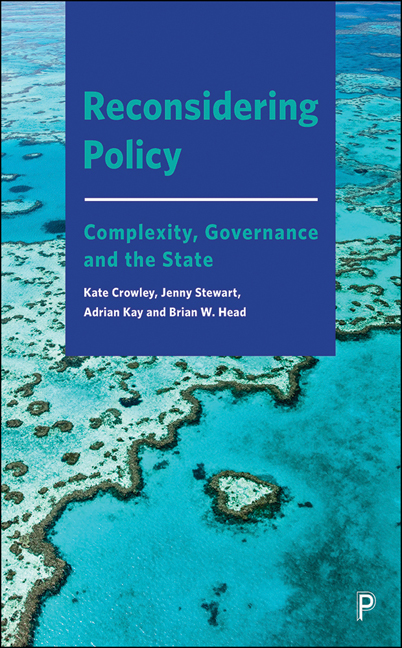Book contents
- Frontmatter
- Contents
- Detailed contents list
- List of tables
- List of abbreviations
- Notes on authors
- Preface: Re-Thinking the Policy Sciences after the ‘Governance Turn’ – Identifying and Creating a (more) Capable State
- 1 Reconsidering Policy – our Agenda
- 2 Reconsidering Policy Systems
- 3 Reconsidering Institutions
- 4 Reconsidering the State
- 5 Reconsidering Borders
- 6 Reconsidering Advice and Advisory Systems
- 7 Reconsidering Information
- 8 Reconsidering Implementation
- 9 Reconsidering Policy Change
- 10 Reconsidering Policy – our Agenda Revisited
- References
- Index
10 - Reconsidering Policy – our Agenda Revisited
Published online by Cambridge University Press: 23 February 2021
- Frontmatter
- Contents
- Detailed contents list
- List of tables
- List of abbreviations
- Notes on authors
- Preface: Re-Thinking the Policy Sciences after the ‘Governance Turn’ – Identifying and Creating a (more) Capable State
- 1 Reconsidering Policy – our Agenda
- 2 Reconsidering Policy Systems
- 3 Reconsidering Institutions
- 4 Reconsidering the State
- 5 Reconsidering Borders
- 6 Reconsidering Advice and Advisory Systems
- 7 Reconsidering Information
- 8 Reconsidering Implementation
- 9 Reconsidering Policy Change
- 10 Reconsidering Policy – our Agenda Revisited
- References
- Index
Summary
Introduction
Analysis of public policy is a daunting task. The esteemed Canadian writer Richard Simeon acknowledged this some decades ago when he rejected the emphasis on narrow analytical policy skills (Simeon, 1976), and instead called for a broad analytic approach that is ‘holistic and contextually situated’ (Skogstad and White, 2017: 666). However, over the last 40 years, policy approaches have fractured and scattered rather than become holistic and integrated, with theorists attempting to make sense of this variety by identifying strands or families of theory, or proposing models for, or thematic approaches to, theoretical synthesis (Ayres and Marsh, 2013). Some are driven into narrow areas of specialisation where they build sub-fields that, in our view, lose efficacy and relevance for complex problem-solving solving insofar as they neglect broader political and systemic contexts. However, not all policy analysis is concerned to assist with problem-solving and improved policy, as we are in this book, nor concerned with our focus on the governance of wicked problems, crisis responses and the building of more resilient, effective policy contexts.
Our book is inspired by the conviction that useful knowledge comes from building on various sources of policy analysis expertise, while also recognising the wider context of policymaking, and the value of policy theories anchored in evaluative, empirical and comparative case studies. We have also argued that policy studies should refocus on state capacity, and on the roles of politics, policy and institutions in building capacity to effect positive change. We are interested in policy change and policy improvement because of the persistence of challenging problems, like climate change, massive inequalities in health and housing, cyber security, urban congestion and the like – and the longstanding failure of states and policy processes to alleviate or resolve them. We are interested in resilience in the face of crises and in new forms of governance, often collaborative, and the reinvention of the state that is inspired by policy evaluation, learning and adaptation.
We believe, as applied theorists, that policy studies should be relevant to problem-solving. We suggest that making policy analysis relevant requires an understanding of theory and practice, but also engagement with political and institutional structures, processes and systems.
- Type
- Chapter
- Information
- Reconsidering PolicyComplexity, Governance and the State, pp. 185 - 196Publisher: Bristol University PressPrint publication year: 2020



